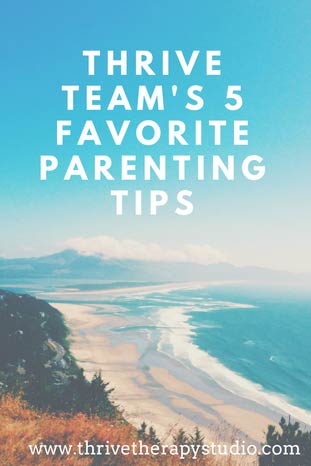We at Thrive thought it would be fun to share a joint blog from our team of therapists where we each share one of our favorite parenting tips. Since we all have different perspectives, this is a great way to get to know each of us as a therapist. Hope you like it and find our ideas helpful!
Lindsey Brady, LMFT – How to support your child through tough feelings
In practice, I often work with children who experience difficulty with self-regulation, anger, and tantrum behaviors. A big part of what I do is help parents to understand developmental levels and how to support their kids through the “tough stuff.” Often, as parents, we expect our children to be respectful and behave appropriately and it’s easy to forget that kids often don’t understand or know how to manage their emotions. It’s important to teach children that ALL feelings are okay, even the ones that seem socially unacceptable, like anger or jealousy, and that all feelings pass with time. Encourage your kids to do something with their feelings if they need to. Invite them to be still or to share, cry, or communicate. If a child is unable to regulate and engages in inappropriate behaviors, parents can lovingly disengage and remind themselves that the behavior is not a reflection of their parenting or their child’s lack of respect, but more a lack of skill in dealing with the emotion or situation. Stepping back in the moment and addressing it when everyone is calm enables the child to be in an emotional space to learn and allows the parent space to explain and correct in a calm and loving way.
Maria Fowlks, PsyD – Validate your child’s feelings
Validating your child’s emotions helps them feel heard and understood, and it lets them know their feelings matter. When you do this, you are sending the message you love and accept them regardless of how they think and feel. It is important to honor and validate the big and small things, because what may seem small to you is likely very big to them. It shows them you care and think their feelings are important. It teaches them that ALL feelings are valid.
Jennifer Gonzalez, LMFT – Provide your child with options
I am almost sure that you have heard “children like to have options” before. I agree with this statement completely. Children and adolescents like to feel like they are in control and hold power, and who doesn’t?
Well, I would like to offer you an extension of that. Giorgio Nardone creator of Brief Strategic Therapy designed an intervention called “illusion of alternatives” which is exactly what it says; it gives the illusion that the person has an alternative. This intervention is a real elegant way in which you offer the possibility of a option: The first option is very frightening and almost impossible for the person to complete and the second option is one that is less threatening and easier to put into practice.
Translating this into child and adolescent terms: the first option should be one that is boring, tedious, and annoying to them. The second option (the one that you really want them to choose) should be doable, easy and in many ways more appealing. For example you may say: “Would you rather vacuum the entire house or take out the trash?” or for adolescents “Would you rather do the dishes and put them away or vacuum the living room.”
Angela Bianco, ASW – Helping parents shift from being reactive to proactive in parenting
Taking time to reflect on your parenting and interactions with your child is crucial in learning to shift from being reactive to proactive in parenting. Unfortunately, because our lives are so busy, parents are more likely to operate from a reactive state of mind instead of working from a clear set of principles and strategies. Instead of just reacting, try asking yourself the following questions: Why did he act this way? What’s the lesson? How can I best teach it? Use these questions and your overarching parenting principles you want to use to guide your parenting as a guide for how to intervene and teach your child.
Erica Wollerman, PsyD – Knowing when to let your kid fail
As many of you who read the Thrive blog know, I am passionate in my belief that as parents, one of the best things we can do is to allow your child to fail at times. I believe strongly in the importance of teaching kids that failure is okay because it means you are trying new things and leaving your comfort zone. The other great thing about allowing your kids to fail is that you can then coach them through the failure. Teaching them how to fix things after mistakes, how to manage their feelings about the failure, and that it is okay to fall down only helps build grit and resiliency in all of us. As parents, this is a great gift you can give your children that will help them be more successful and resourceful in the future!
We hope you enjoyed our first group blog! There will hopefully be many more to come in the future so that we can continue sharing our many different experiences and thoughts with you!
If you would like to talk with a Thrive Therapist about yourself, your child, or teen attending therapy, please reach out to us by phone at (858) 342-1304.
As always, thanks for reading and comments are always welcome regarding any issues around child or teen psychotherapy services in San Diego by Thrive Therapy Studio.
To stay in the loop on the services offered and to receive updated information about Thrive, please feel free to sign up for the newsletter through the following link: http://eepurl.com/cvGx5n.
Reach out to start
your healing journey


